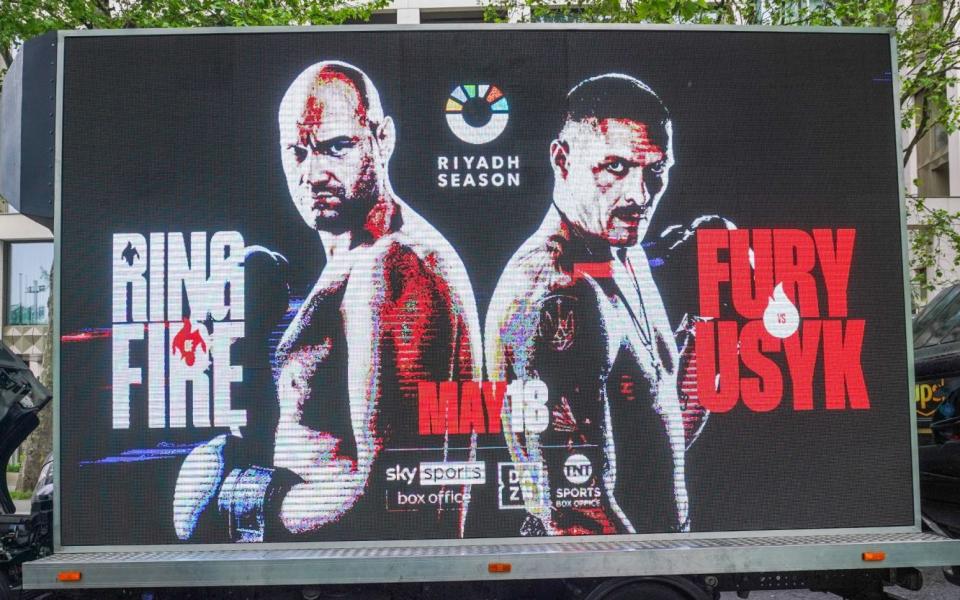This is the week proper boxing can fight back against the YouTubers

“Undisputed”. It feels an incongruous label to attach to Saturday night’s Saudi square-off between Tyson Fury and Oleksandr Usyk. After all, just about every facet of the fight has been subject to interminable dispute, from the venue to the date to the split of the £115 million prize purse.
But now, at last, boxing has conjured a genuine blockbuster, the first bout for 25 years in which every belt in the heavyweight division is on the line. The timing, given the soul-sinking prospect of 57-year-old Mike Tyson emerging from retirement this summer to confront trash-talking YouTuber Jake Paul, could hardly be more auspicious.
In an era of ever kitschier crossover experiments, the sport finally has a spectacle to propel the winner to genuine greatness. Both men have earned their shot: Fury with his twin triumphs over Deontay Wilder, Usyk with two clinical dismantlings of Anthony Joshua.
Each fighter also has a backstory worthy of the occasion, given Fury’s recovery from severe mental illness and Usyk’s enlistment in the Ukrainian army during the weeks after Russia’s invasion. All told, it is a potent antidote to listening to KSI, social media star and chief executive of the aptly-named Misfits Boxing, call out Conor McGregor for a fight that will be a box-office sensation yet mean nothing.
Gravitas: that is the quality promised by this weekend’s Riyadh showdown. Or at least it is when Fury’s father is not let loose to headbutt the smallest member of Usyk’s entourage.
Undisputed champions have been rare in the four-belt era, with just nine men holding the distinction since 2004. When Lennox Lewis became the last in the heavyweight division to wear the crown, a quarter of a century ago, it was only for three major belts, plus the lesser-regarded International Boxing Organisation title. Whoever completes the quadruple here on the outskirts of the Saudi capital, there will be no denying the magnitude of the feat.
Turki Alalshikh, advisor at the Saudi royal court and chairman of the kingdom’s General Entertainment Authority, heralds Fury versus Usyk as the “crown jewel” of his efforts to annex boxing’s splintered landscape. Nobody in the sport wields power quite like this hyper-ambitious 42-year-old, rarely photographed without his sunglasses. Without his bankrolling, it is doubtful this fight would ever have come to pass. And while the bounties on offer might be distasteful – Fury stands to make over £80 million if he wins – the figure pulling the strings insists he is a purist at heart.
“We don’t want to see any YouTuber again,” he says. “I want to see the fighters.”
Fatigued by the freak show
It signals an encouraging pushback against the wannabes and never-will-bes whose hubris has rendered boxing a bad joke of late. Only last year, Saudi Arabia confected the streamers’ delight of Paul’s battle against ex-Love Island contestant Tommy Fury, Tyson’s half-brother. It was a tawdry exercise, with Paul’s provocation even extending to revealing the birth of his opponent’s baby before the younger Fury or his partner could do so.
Now it appears as if Alalshikh has grown fatigued by the freak show, deciding that true cachet resides in staging the fights that matter.
For all the absurdities of the preamble, his latest production is one of far-reaching significance. You can detect as much in Fury’s unusual deference towards Usyk, acclaiming him as a “great fighter”, and in the Ukrainian’s argument that he fights for “legacy, not money”.
It feels a stretch to depict this as a throwback to the 1970s, when the status of undisputed heavyweight champion of the world could legitimately be called the ultimate prize in sport. “He is either the toughest man in the world or he is not, but there is a real possibility he is,” wrote Norman Mailer. “It is like being the big toe of God. You have nothing to measure yourself by.”
What elevated that period was how often the icons fought each other. Muhammad Ali and Joe Frazier faced off three times, with the first the “Fight of the Century” at Madison Square Garden and the third the “Thrilla in Manila” four years later, a symphony of remorseless brutality. Even in the 1990s, the headline duels were regularly drawn: Lewis, in gaining his “undisputed” tag, twice took on Evander Holyfield, who in turn had a trilogy to savour against Riddick Bowe.
The tactic today, by contrast, tends to be one of mutual avoidance, with the pre-eminent fighters dancing around one another so long that the moment is lost. The carrot of an all-British showdown between Fury and Anthony Joshua has been dangled ad nauseam, but with both in their mid-30s, is it ever likely to happen? Even this collision of Fury and Usyk, twice postponed over the past six months, has only been enabled by a gargantuan sovereign wealth fund.
It is no wonder everybody involves genuflects at Alalshikh’s feet. “His Excellency”, simpers Fury, not normally a man fond of honorifics, conscious that the Saudis have made him rich beyond his wildest imaginings.
But if there is a better reason to be grateful to Alalshikh, it is that he has recognised that boxing is broken, drowning in a bubble bath of YouTube froth. This week, he has suggested that the ghastly Tyson-Paul match-up in Dallas in July is rigged, urging the older man to “forget the script”. It offers a sign that in the struggle for prominence between the true champions and the fame-hungry imitators, the pendulum is at last swinging back in the right direction.


